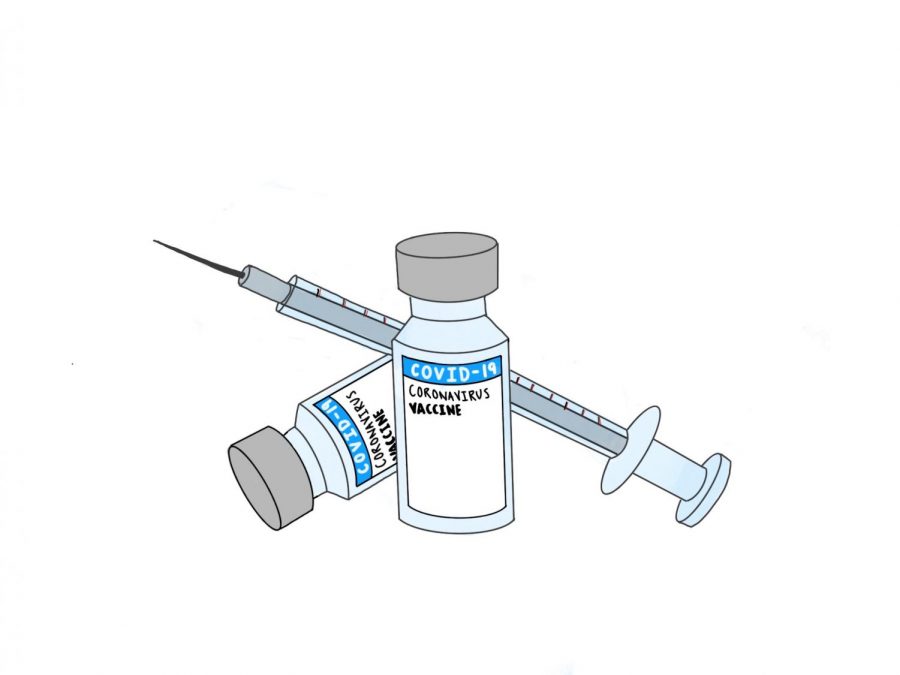Vaccines Offer Hope for Returning to School and Normality
The Pfizer-BioNTech and Moderna vaccines both have been approved for distribution throughout the U.S., representing a key development toward overcoming the pandemic. Staff illustration: Dorinda Xiao.
January 12, 2021
As America has authorized and begun inoculations of the Pfizer-BioNTech and Moderna COVID-19 vaccines, economists, school leaders and scientists all see this development as a key step in rebuilding the economy and recreational life. In order for life to return to the pre-pandemic normal, widespread distribution of the vaccine is necessary to reach the threshold for herd immunity.
“There are two paths to herd immunity for COVID-19 — vaccines and infection,” according to the Mayo Clinic. “Vaccines create immunity without causing illness or resulting complications.”
Even before herd immunity is reached, vaccine distribution can still create drastic benefits, as vaccinating at-risk populations should lower infection and fatality rates. Currently, the Pfizer-BioNTech vaccine has a reported 95% efficacy rate and the Moderna vaccine has a reported 94.1% efficacy rate. Pfizer began vaccinations in the U.S. on Dec. 14, according to the Associated Press, and Moderna began vaccinations in the U.S. on Dec. 21.
This rush to begin vaccinations has also spurred claims about the danger of vaccines by people on both sides of the political spectrum. Despite evidence that vaccines are the key to eventually ending the pandemic and that there are no serious side effects of either of these vaccines, a study by the Pew Research Center found that 21% of U.S. adults do not intend to get vaccinated and are “pretty certain” more information will not change their mind..
While the distribution process and patient priorities in receiving the vaccine differs from state to state, the general consensus is that at-risk populations such as healthcare workers, nursing home residents and seniors with comorbid conditions would be first in line to get a vaccination.
The prospect of prioritizing teachers, who are considered essential workers, has also been discussed. “I’m a big believer that educators should have priority after health care workers,” American Federation of Teachers President Randi Weingarten told U.S. News.
Menlo Head of School Than Healy echoed that sentiment, and even though he has stated his belief that “schools are among the safest places you can be [during the COVID-19 pandemic],” he agrees that teachers should be prioritized in gaining this extra layer of protection. “My hope is that teachers and coaches would be high on that [vaccination priority] list,” Healy said.
“My hunch is that high school students and middle school students aren’t going to be the highest priority,” Healy said. This prediction is almost certain to be true, as neither the Pfizer-BioNTech vaccine or the Moderna vaccine have been authorized for children under the age of 16, though research is underway to determine the vaccines’ safety and efficacy in children.
However, if herd immunity is achieved, students will not necessarily need to be vaccinated before school returns to a semblance of normality. “Herd immunity would require at least 60-70% of the population to have COVID-19 immunity, and that translates to roughly 200 million [Americans],” according to the Missouri University Health Care website.
“It may be the mid to latter part of 2021 before we have enough vaccine available in the U.S. to really immunize that large of a percentage of the population,” Stanford professor of medicine and infectious disease expert Dr. Dean Winslow told NBC News Bay Area. This projection lines up with the beliefs of other infectious disease experts, with the most optimistic projections showing herd immunity in the spring.
Healy is optimistic about the vaccination timeline. “I would love it if [we reach that critical level in] June, and we can open next year with a normal school year,” Healy said.














